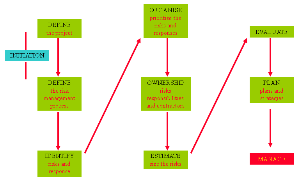Risk management - Manage - plans and strategies
The Risk Management process
MANAGE - plans and strategies
The base plan is in place and has been implemented.
This area is all about control.
No plan is foolproof and will probably require some modifications.
Control will require:
- Implementing the plan
- Monitoring the activities
- Making sure that new action plans materialise in time for the horizon planning
- Dealing with any other problems
All of these activities will run in parallel.
Implementing the plans
Management will require many aspects including communication, personal and motivational skills.
Empowerment is important. If plans are too rigid in the detail, flexibility is lost and the decision making potential of individuals is reduced.
The higher the experience and skill level of the personnel the greater is the opportunity to have more flexible and less detailed plans.
Monitoring the plan
Monitoring the plan requires the collection of data on its progress and presenting this at regular project team meetings.
In the main, the project team meetings will be conducted by exception.
Progress is usually followed using a Gantt chart which shows tasks as a series of blocks in rows. This is the project schedule.
Modern software e.g. Microsoft Project, is very useful for managing the schedule and look at the affect of various scenarios.
The meetings must encourage openness. The aim is to identify quickly where there are problems and correct them in an appropriate manner.
Dealing with any other problems
Naturally, the risk management process should have eliminated major unforeseen circumstances.
However, you can never guarantee that a major problem doesn’t appear and create a crisis.
Dealing with crisis management may not be cost effective especially if you are trying to regain time.
Making sure that new action plans materialise in time for the horizon planning
The action plans needed to go beyond the next horizon will need addressing.
To implement these:
- The action plans will require review to add the necessary detail. This will include ownership, resource allocation etc.
- You should summarise and prioritise the risk and responses for the action plan.



